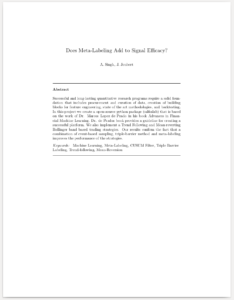Research Update, March 2019
This weeks research was consumed by the concept of Meta-Labeling, how it works, and does it work out-of-sample?
We have published a research report as well as an accompanying slide show.
There was quite a bit of discussion regarding this topic, the following is a link to a Github issue where a few friends and I discuss it at length: Meta-Labeling Q&A.
Maksim Ivanov (Edit: Joined us later in August 2019 as a researcher) wrote a good blog post on it this week as well: Financial Machine Learning Part 1: Labels
Goals for the Next Sprint
We are finished with part 1 of our Capstone project so we will be able to turn our attention to the mlfinlab package and add some more source code. I will be adding in chapter 3 code which we used in our Jupyter notebooks. Proskurin Oleksandr (Github) is busy building the imbalance and run bars, I am busy reviewing his pull request. Lionel Young (Github) has started a meet up group in Singapore focused on algorithmic trading. I will do the same when I get back to London in April (or join one).
Research Report
Abstract
Successful and long-lasting quantitative research programs require a solid foundation that includes procurement and curation of data, creation of building blocks for feature engineering, state of the art methodologies, and backtesting.
In this project we create a open-source python package (MLFinLab) that is based on the work of Dr. Marcos Lopez de Prado in his book Advances in Financial Machine Learning. Dr. de Prado’s book provides a guideline for creating a successful platform. We also implement a Trend Following and Mean-reverting based trading strategies. Our results confirm that a combination of event-based sampling, triple-barrier method, and meta-labeling improves the performance of the strategies.
The slide show presentation of this report is also in our Github repo titled: Improved Signals.
This document is more of a project report, our goal in Capstone 2 is to write an academic paper. (I would have liked more time to fix the formatting and flow of this document)
Contributors Wanted
We would like to thank everyone who has helped this project get off the ground, we are gaining some good momentum.
If contributing to the package is something you would like to involved in then please do email us at: research@hudsonthames.org
In the following week we will set up a contributors attribution page as well.
Presentations
Improved Signals
Does Meta-Labeling Add to Signal Efficacy? A slide show presentation illustrating how meta-labeling results in improved performance metrics for investment strategies (out-of-sample). It is a technique that every discretionary and systematic fund should employ and will aid fundamental firms transition to quantamental.
Data Driven Investments
Highlights the business process that hedge funds need to go through. This includes starting a hedge fund, raising capital, third party services providers, and flow of capital.
Hackathon Portfolio Optimization
Linear financial modeling is prime for disruption. In this presentation we show how de Prado’s Hierarchical Risk Parity portfolio optimization outperforms mean variance and other techniques (out-of-sample). This slide show was developed for the Capitec Bank hackathon where we won a small prize for best “Spirit”.
Quantcon 2018
A quick review of our experience at Quantcon. This is where Ashutosh and Jacques met for the first time in person and got signed copies of Marcos Lopez de Prado’s latest book Advances in Financial Machine Learning. The presentation is based on the keynote lecture by de Prado: The 7 Reasons Most Machine Learning Funds Fail.
Development Tools
A brief presentation on the tools we are using in the development of mlfinlab. It can also be seen as our way of work. TLDR: Github as a developer platform, Travis-CI for continuous integration (code style checks, 100% code coverage, unit test checks, documentation, push to PyPi Index), Pycharm as a dev-environment, Jupyter Lab as a research environment.








